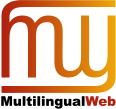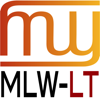Tag(s): mlw-lt
Posts
New Working Draft of Internationalization Tag Set (ITS) 2.0
A new version of Internationalization Tag Set (ITS) 2.0 draft has just been published as a Working Draft.
ITS 2.0 responds to current and future needs to extend ITS 1.0, that is: provide metadata (ITS “data categories”) also for HTML5, use the data categories for RDF, and add new data categories relevant for localization and language technologies.
In addition to various clarifications and smaller changes, this second version of the document provides several new data categories discussed during the MultilingualWeb workshop in Dublin in June (e.g. Domain and Locale Filter).
Please take a look at the new version, and send any comments to public-multilingualweb-lt-comments@w3.org (subscribe at the archive main page). Use “ITS 2.0 WD Comment” at the beginning the subject line of your email, and add something descriptive after it.
Send any comments before the end of August. We are planning to publish a new working draft in late August, and a feature complete “last call” working draft in November.
Dublin MultilingualWeb workshop report now available

A report summarizing the MultilingualWeb workshop in Dublin is now available from the MultilingualWeb site. Alongside the summaries are links to slides, video recordings, and the IRC log, for each speaker and for the discussion sessions.
Entitled “The Multilingual Web – Linked Open Data and MultilingualWeb-LT Requirements”, the workshop focused on two specific topics: the intersection between Linked Open Data and Multilingual Technologies, and requirements of the W3C MultilingualWeb-LT Working Group.
In both areas, the workshop was a great success. First, it helped to connect leading experts in the areas of linked open data, language technologies, terminology and localization. And second, detailed discussion about MultilingualWeb-LT requirements provided a major input to the creation of the first public working draft of Internationalization Tag Set (ITS) 2.0.
This workshop was unlike previous workshops because its focus was specific to two topics, and the audience was intentionally restricted to experts in those areas. The MultilingualWeb-LT project plans to hold additional workshops next year that will have the broad scope and similar format to previous workshops.
Slides, Videos, and IRC logs available for Dublin MultilingualWeb workshop

The program page of the 5th MultilingualWeb Workshop in Dublin on Multilingual Linked Open Data and the MultilingualWeb-LT Requirements has now been updated with links to speakers’ slides, IRC logs, and video recordings (hosted by Videolectures). It also includes links to social media information (such as tweets) about the workshop. If you have any blog posts, photos, etc. online that you would like to add to the page, please let Arle Lommel (arle.lommel@dfki.de) know so that we can link to them from this page.
The workshop was a great success. While intentionally smaller than previous Multilingual Web workshops, it brought together many of the world’s leading experts in the emerging field of linked open data and multilingual linked open data. Thanks to the efforts of the excellent speakers and the local organizers at Trinity College Dublin, the program was of great benefit to attendees.
A summary report of the workshop will follow soon.
First Public Working Draft published: Internationalization Tag Set (ITS) Version 2.0
After discussing requirements at a dedicated workshop in June, the MultilingualWeb-LT Working Group has published a first public working draft of Internationalization Tag Set (ITS ) 2.0.
ITS 2.0 responds to needs that emerged since the creation of ITS 1.0 in 2007. First, ITS 2.0 focuses on HTML5. We can expect that huge amounts of Web content will be produced using HTML5 in the future, and ITS 2.0 will provide the means to properly internationalize and localize HTML5, using both human translation or language technologies like machine translation.
In addition, ITS 2.0 builds bridges to the Semantic Web area, by providing mechanisms to re-use ITS metadata (so-called “data categories”) with RDF.
Finally, ITS 2.0 defines new data categories that are demanded by the localization and language technology communities.
The development of this first draft of ITS 2.0 would not have been possible without the MultilingualWeb project: via MultilingualWeb, stakeholders of quite diverse communities have provided input to the initial metadata definitions. The W3C Internationalization Activity is now the place for these communities to move that metadata and its implementations forward.
We very much welcome feedback also from outside the Working Group – see issues discussed within the Working Group. Please send your comments to public-multilingualweb-lt-comments@w3.org. Use “ITS 2.0 WD Comment” at the beginning the subject line of your email, and add something descriptive after it. The archives for this list are publicly available.
Editors: Dave Lewis (TCD), Arle Lommel (DFKI), Felix Sasaki (DFKI/W3C Fellow), Jirka Kosek (UEP)
Program published for MultilingualWeb Workshop in Dublin!

The program has been published for the upcoming W3C MultilingualWeb workshop on Linked Open Data and the MultilingualWeb-LT Project Requirements in Dublin, 11–13 June 2012.
Divided into two portions, the first day (11 June) will focus on Linked Open Data. The keynote presentation will be given by David Orban, CEO of dotSUB, who will be followed by a full day of presentations on various aspects of Linked Open Data. The following two days will deal more specifically with development of the MultilingualWeb-LT project’s requirements document. Speakers come from organizations like Adobe Systems, the European Commission, the World Wide Web Consortium, and leading research institutions from around the world.
See the Call for Participation for details about how to register for the workshop. Participation in the workshop is free.
Important: The deadline for registration is May 30. Please be sure to register by then.
The MultilingualWeb workshops, funded by the European Commission and coordinated by the W3C, looks at best practices and standards related to all aspects of creating, localizing and deploying the multilingual Web. The workshops are successful because they attracted a wide range of participants, from fields such as localization, language technology, browser development, content authoring and tool development, etc., to create a holistic view of the interoperability needs of the multilingual Web.
We look forward to seeing you in Dublin!
MultilingualWeb Dublin speaker deadline extended, don’t delay!

The deadline for submissions to speak at the Multilingual Web – Linked Open Data and MultilingualWeb-LT Requirements in Dublin has been extended until 9 May. We are building a strong program with expected contributions from Adobe, the Centre for Next Generation Localisation, the Italian National Research Council (CNR), the European Commission, Google, and many others, and we will be filling the remaining slots soon.
If you want to speak at the event register as soon as possible.
This MultilingualWeb workshop will be held in Dublin, Ireland, hosted by Trinity College Dublin.
The purpose of this workshop is two-fold: first, to discuss the intersection between Linked Open Data and Multilingual Technologies (11 June), and second, to discuss Requirements of the W3C MultilingualWeb-LT Working Group (12 – 13 June). We expect that both topics will attract an overlapping set of participants, and we hope to increase the overlap by this workshop.
Participation is free. We welcome participation from both speakers and non-speaking attendees. For more information and to register, see the Call for Participation.
W3C Workshop, Call for Participation: The Multilingual Web – Linked Open Data and MultilingualWeb-LT Requirements

11 – 13 June 2012, Dublin, Ireland, hosted by Trinity College Dublin.
Organized by the MultilingualWeb-LT Working Group, the purpose of this workshop is two-fold: first, to discuss the intersection between Linked Open Data and Multilingual Technologies (11 June), and second, to discuss Requirements of the W3C MultilingualWeb-LT Working Group (12 – 13 June). For more information, see the Call for Participation.
Participation is free. We welcome participation from both speakers and non-speaking attendees. However, whereas future MultilingualWeb workshops will continue the wide-ranging format of previous MultilingualWeb events, and will aim again at a larger audience, attendees for this workshop are required to participate actively in discussions and will need to submit a position statement for the workshop registration. There are limited spaces available.
The MultilingualWeb Working Group aims to define meta-data for web content (mainly HTML5) and “deep Web” content (for example a CMS or XML files from which HTML pages are generated) that facilitates its interaction with multilingual technologies and localization processes.
W3C Launches Work to Simplify Creation of Content in World’s Languages
Today W3C announced new work to make it easier for people to create Web content in the world’s languages. The lack of standards for exchanging information about translations is estimated to cost the industry as much as 20% more in translation costs, amounting to billions of dollars. In addition, barriers to distributing content in more than one language mean lost business. Multinational companies often need to translate Web content into dozens of languages simultaneously, and public bodies from Europe and India typically must communicate with citizens in many languages. As the Web becomes more diverse linguistically, translation demands will continue to grow.
The MultilingualWeb–LT (Language Technology) Working Group will develop standard ways to support the (automatic and manual) translation and adaptation of Web content to local needs, from its creation to its delivery to end users. Read the press release and learn more about the W3C Internationalization Activity. The MultilingualWeb-LT Working Group receives funding from the European Commission (project name LT-Web) through the Seventh Framework Programme (FP7).
W3C® liability, trademark and permissive license rules apply.
Questions or comments? ishida@w3.org
